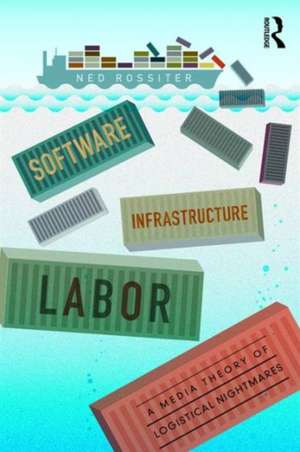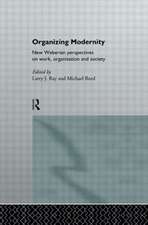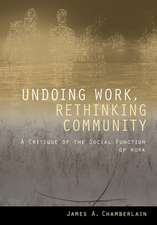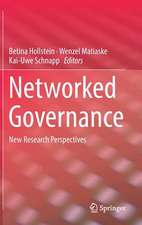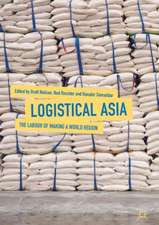Software, Infrastructure, Labor: A Media Theory of Logistical Nightmares
Autor Ned Rossiteren Limba Engleză Paperback – 26 iul 2016
We live in a computational age where media, again, disappear into the background as infrastructure. Software, Infrastructure, Labor intercuts transdisciplinary theoretical reflection with empirical encounters ranging from the Cold War legacy of cybernetics, shipping ports in China and Greece, the territoriality of data centers, video game design, and scrap metal economies in the e-waste industry. Rossiter argues that infrastructural ruins serve as resources for the collective design of blueprints and prototypes demanded of radical politics today.
| Toate formatele și edițiile | Preț | Express |
|---|---|---|
| Paperback (1) | 299.58 lei 6-8 săpt. | |
| Taylor & Francis – 26 iul 2016 | 299.58 lei 6-8 săpt. | |
| Hardback (1) | 1159.63 lei 6-8 săpt. | |
| Taylor & Francis – 14 iul 2016 | 1159.63 lei 6-8 săpt. |
Preț: 299.58 lei
Preț vechi: 374.47 lei
-20% Nou
Puncte Express: 449
Preț estimativ în valută:
57.33€ • 60.28$ • 47.37£
57.33€ • 60.28$ • 47.37£
Carte tipărită la comandă
Livrare economică 16-30 aprilie
Preluare comenzi: 021 569.72.76
Specificații
ISBN-13: 9780415843058
ISBN-10: 0415843057
Pagini: 220
Ilustrații: 11
Dimensiuni: 152 x 229 x 19 mm
Greutate: 0.3 kg
Ediția:1
Editura: Taylor & Francis
Colecția Routledge
Locul publicării:Oxford, United Kingdom
ISBN-10: 0415843057
Pagini: 220
Ilustrații: 11
Dimensiuni: 152 x 229 x 19 mm
Greutate: 0.3 kg
Ediția:1
Editura: Taylor & Francis
Colecția Routledge
Locul publicării:Oxford, United Kingdom
Public țintă
Postgraduate and UndergraduateCuprins
Preface. Chapter 1. Introduction: Logistical Media Theory. Chapter 2. Logistical Worlds. Chapter 3. Into the Cloud. Chapter 4. Economies of Waste. Chapter 5. New Regimes of Knowledge Production. Chapter 6. Coded Vanilla. Chapter 7. Imperial Infrastructures. Chapter 8. Sovereign Media and the Ruins of a Logistical Future. Index.
Notă biografică
Ned Rossiter is Professor of Communication with a joint appointment in the Institute for Culture and Society and the School of Humanities and Communication Arts at Western Sydney University. He is the author of Organized Networks: Media Theory, Creative Labour, New Institutions (2006).
Recenzii
"Ned Rossiter's remarkable contribution effectively inaugurates a new branch of media theory - a media theory of logistics which addresses the movement of bodies and things, labor and commodities underlying the flows of information. Grounded in empirical and collective research projects, it moves between China, India, Australia, Europe and South America to chart and diagram what runs beneath the smooth surfaces of digital networks. A brilliant piece of research, highly recommended." –Tiziana Terranova, University of Naples, 'L'Orientale'
"Ned Rossiter is one of the finest analysts of the old, middle-aged, and newer media around. Software, Infrastructure, Labor brings together his central concerns in a bold and exciting way. Read on and feel the scales drop from your eyes!" –Toby Miller, Loughborough University London
"Ned Rossiter is one of the finest analysts of the old, middle-aged, and newer media around. Software, Infrastructure, Labor brings together his central concerns in a bold and exciting way. Read on and feel the scales drop from your eyes!" –Toby Miller, Loughborough University London
Descriere
Infrastructure makes worlds. Software coordinates labor. Logistics governs movement. These pillars of contemporary capitalism correspond with the materiality of digital communication systems on a planetary scale. Ned Rossiter theorizes the force of logistical media to discern how subjectivity and labor, economy and society are tied to the logistical imaginary of seamless interoperability. Contingency haunts logistical power. Technologies of capture are prone to infrastructural breakdown, sabotage, and failure. Strategies of evasion, anonymity, and disruption unsettle regimes of calculation and containment.
We live in a computational age where media, again, disappear into the background as infrastructure. Software, Infrastructure, Labor intercuts transdisciplinary theoretical reflection with empirical encounters ranging from the Cold War legacy of cybernetics, shipping ports in China and Greece, the territoriality of data centers, video game design, and scrap metal economies in the e-waste industry. Rossiter argues that infrastructural ruins serve as resources for the collective design of blueprints and prototypes demanded of radical politics today.
We live in a computational age where media, again, disappear into the background as infrastructure. Software, Infrastructure, Labor intercuts transdisciplinary theoretical reflection with empirical encounters ranging from the Cold War legacy of cybernetics, shipping ports in China and Greece, the territoriality of data centers, video game design, and scrap metal economies in the e-waste industry. Rossiter argues that infrastructural ruins serve as resources for the collective design of blueprints and prototypes demanded of radical politics today.
